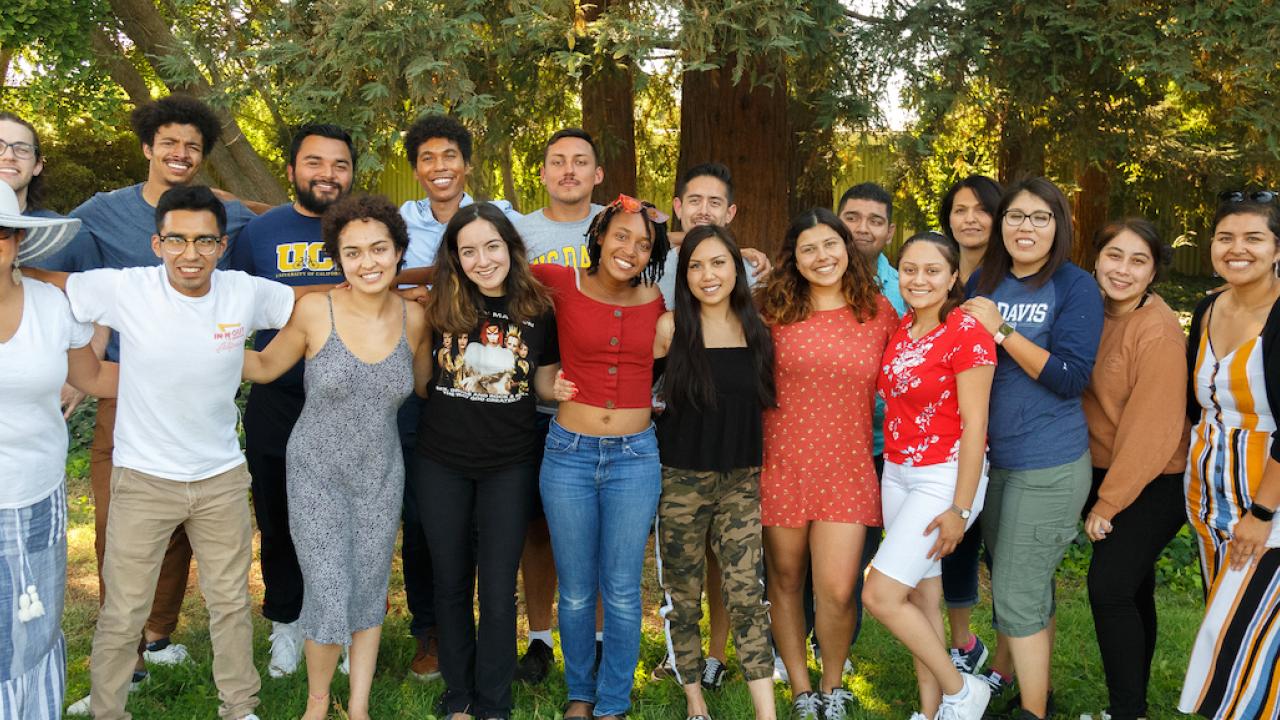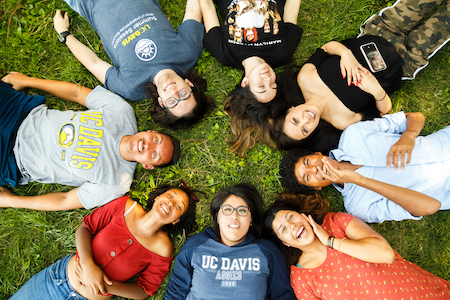
You Belong Here: Transfer Edge Creates Community
On a late summer afternoon, 13 students are gathered around a seminar table waiting for class to start, buzzing with the kind of noisy chatter and laughter you find in a class where the students are comfortable and enjoy each other’s company.
Six weeks earlier, these students were brand new to campus. Excitement about coming to UC Davis was giving way to the anxiety and imposter syndrome that greets many students transferring to the prestigious University of California. “The first day, I was crying in my dorm,” says Guadalupe Calderon. “It turns out we were all crying in our dorms!”
This is the inaugural Transfer Edge cohort at UC Davis. Students met twice weekly throughout Summer Session 2 for a seminar on How to Succeed at a Research University specially created for transfer students. Taught by Lina Mendez, Associate Director of the Center for Chicanx and Latinx Student Success, the class featured campus presenters on topics from how to get involved with research to where to find counseling resources. Many of those speakers had themselves been transfer students.
The Transfer Challenge
About one-third of UC Davis graduates enter as third-year transfers as part of the state’s educational master plan. Many of these students have faced significant challenges to get here. Some are older students who feel out-of-place and insecure, despite their valuable life experiences. Once here, they are beset with imposter syndrome, feel like they don’t belong or can’t succeed. And without the dedicated social programs of freshman year, students often find it challenging to connect with others.
The Transfer Edge pilot program set the lofty goal of giving transfer students a solid foundation combining a major-required class, introduction to co-curricular opportunities to enhance their education, critical communication and time-management skills – and most important of all, a group of friends to begin their Aggie careers. Summer Sessions has long offered a way to get a head start, adjust to the quarter system, and access high-demand classes that may be waitlisted during the academic year. By offering the seminar, group activities, and optional on-campus housing, Transfer Edge creates a center of gravity that will let students create bonds and gain confidence while discovering all that UC Davis offers.
A Diverse Group with a Close Bond
 In its first year, Transfer Edge attracted 25 students placed in two seminar groups. They came from all over California (one from out-of-state), representing 12 majors, and ranging in age from 20 to 48. Most are first generation college students. All are making huge adjustments from community college.
In its first year, Transfer Edge attracted 25 students placed in two seminar groups. They came from all over California (one from out-of-state), representing 12 majors, and ranging in age from 20 to 48. Most are first generation college students. All are making huge adjustments from community college.
Envisioned by Summer Sessions director Danica Fisher and coordinated by Jenny Choc, the pilot program was a great success. According to Fisher, “In many cases, our students exceeded academic expectations, made use of campus support resources, and overwhelmingly credited the First Year Seminar as being an important bridge to the first quarter. Our students report that as a result of the workshops they have gotten involved in undergraduate research and other co-curricular opportunities during their first academic quarter.” In 2020's remote environment, the program has already met Fisher's goal of enrolling 50 students; she hopes to expand to 100 in Summer 2021.
The Moment of Truth
The last class session is the moment of truth: students give final presentations on their journeys from high school through community college to UC Davis, and their Transfer Edge experience.
John comes from a small town in Missouri (he calls it “Misery”) where his was the only family of color. Motivated by a vision of California as a more diverse and inclusive state, he left home to attend Sierra College with the eventual dream of attending a UC on a pre-med track. A sibling’s mental health crisis that year drew him to study psychology. He had a lot of anxiety about transferring to UC Davis, that the students would be better prepared and that it would be hard to get into research. The Transfer Edge seminar changed his perspective. “It was really important to have role models who were just like me. All the presenters we met had been transfer students. If they could do it without the support of a program like this, the sky was the limit for me.” Equipped with new confidence, John reevaluated his five-year goals, and is planning to pursue an MD-PhD.
Edie had to leave high school after tenth grade to contribute financially her household – a memory that still hurts some thirty years later.
Guadalupe didn’t think college was for her. Her sister made her enroll in community college, and that changed her life. She discovered that she loved school “Where I come from, I don’t know of any women that have PhDs,” she said. “Coming here and seeing other Chicana women having PhDs was really inspiring.”
Where I come from, I don’t know of any women that have PhDs. Coming here and seeing other Chicana women having PhDs was really inspiring.
The last student to present is Aliyah. She begins with confidence, calling herself an artsy nerd and talking about how much she enjoyed a watercolor painting lesson at the Shrem Museum. But her journey to UC Davis was difficult. The only Black student at her high school, she was bullied and felt isolated. In community college she had “semester friends” who supported one another through coursework but didn’t stick together. She didn’t expect find a community at UC Davis. But the friendships and experiences of Transfer Edge have been transformative.
Because of Transfer Edge, I’ve changed so much. I’m not even nervous talking to you. I found something that I want to do. I love talking to people, I love being here. Thanks to this program I have opened up a lot. UC Davis has opened things up for me
Her voice trails off as tears begin to flow. Soon half the class is joining her. One classmate asks to hug her and another makes a heart-shaped hand gesture. Aliyah takes a deep breath and expresses her thanks to the people at UC Davis who made Transfer Edge happen. She is ready to succeed.
Links:
